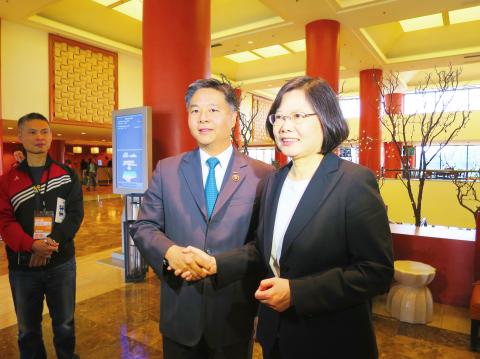Democratic Progressive Party (DPP) Chairperson Tsai Ing-wen (蔡英文) on Saturday held a closed-door forum with eight US academics in Los Angeles to discuss maintaining the cross-strait “status quo.”
Most attendees said the DPP presidential candidate’s proposals made sense, said Clayton Dube, director of the US-China Institute at the University of South California (USC) Annenberg School for Communication and Journalism.
However, Dube declined to elaborate on what Tsai discussed.

Photo: Chen Hui-ping, Taipei Times
DPP Secretary-General Joseph Wu (吳釗燮) told reporters that “what was discussed will not be made public.”
Asked the US’ view of the so-called “1992 consensus,” Dube said the US accepts whatever is agreed upon and conducted in peaceful means between Taiwan and China.
Stanley Rosen, a USC political science professor and member of the US-China Institute, and Wang Feng (王豐), a sociology professor at the University of California at Irvine, also attended the forum.
Tsai has previously said that maintaining the cross-strait “status quo” means maintaining peace, so both sides can pursue development amid peace and stability.
She has declined to support the “1992 consensus,” saying that the term became popular only in 2000, adding that even those who were involved in the Hong Kong negotiations in 1992 have expressed different views about it, as has former president Lee Teng-hui (李登輝).
Beijing on Wednesday last week said that Tsai had to clarify what she meant by “maintaining the status quo” if she were elected.
US Deputy Assistant Secretary of State for East Asian and Pacific Affairs Susan Thornton on May 21 said that, regardless of who wins Taiwan’s presidential election next year, the US “hopes to continue our close cooperation, and it must be said that an important ingredient of that close cooperation in recent years has been the stable management of cross-strait ties.”
Tsai arrived in Los Angeles on Friday for a six-city US tour.
On Saturday, she met with US Representative Ted Lieu (劉雲平), a Taiwanese-American whose grandparents still live in Taiwan, to discuss labor-related issues and the Trans-Pacific Partnership.
At a dinner party hosted for her by Taiwanese expatriates, Tsai said the focus of her cross-strait policy is maintaining the “status quo,” accenting that peaceful development of cross-strait ties would be her administration’s main goal if she were elected.
“I am not here for an interview,” she said, adding that the common language between Taiwan and the US is “democracy, democracy and democracy.”
The “1992 consensus” refers to a supposed tacit deal between the Chinese Nationalist Party (KMT) and Beijing that each acknowledges there is “one China,” with each side having its own interpretation of what “China” means.

CHAOS: Iranians took to the streets playing celebratory music after reports of Khamenei’s death on Saturday, while mourners also gathered in Tehran yesterday Iranian Supreme Leader Ayatollah Ali Khamenei was killed in a major attack on Iran launched by Israel and the US, throwing the future of the Islamic republic into doubt and raising the risk of regional instability. Iranian state television and the state-run IRNA news agency announced the 86-year-old’s death early yesterday. US President Donald Trump said it gave Iranians their “greatest chance” to “take back” their country. The announcements came after a joint US and Israeli aerial bombardment that targeted Iranian military and governmental sites. Trump said the “heavy and pinpoint bombing” would continue through the week or as long

TRUST: The KMT said it respected the US’ timing and considerations, and hoped it would continue to honor its commitments to helping Taiwan bolster its defenses and deterrence US President Donald Trump is delaying a multibillion-dollar arms sale to Taiwan to ensure his visit to Beijing is successful, a New York Times report said. The weapons sales package has stalled in the US Department of State, the report said, citing US officials it did not identify. The White House has told agencies not to push forward ahead of Trump’s meeting with Chinese President Xi Jinping (習近平), it said. The two last month held a phone call to discuss trade and geopolitical flashpoints ahead of the summit. Xi raised the Taiwan issue and urged the US to handle arms sales to

State-run CPC Corp, Taiwan (CPC, 台灣中油) yesterday said that it had confirmed on Saturday night with its liquefied natural gas (LNG) and crude oil suppliers that shipments are proceeding as scheduled and that domestic supplies remain unaffected. The CPC yesterday announced the gasoline and diesel prices will rise by NT$0.2 and NT$0.4 per liter, respectively, starting Monday, citing Middle East tensions and blizzards in the eastern United States. CPC also iterated it has been reducing the proportion of crude oil imports from the Middle East and diversifying its supply sources in the past few years in response to geopolitical risks, expanding

An Emirates flight from Dubai arrived at Taiwan Taoyuan International Airport yesterday afternoon, the first service of the airline since the US and Israel launched strikes against Iran on Saturday. Flight EK366 took off from the United Arab Emirates (UAE) at 3:51am yesterday and landed at 4:02pm before taxiing to the airport’s D6 gate at Terminal 2 at 4:08pm, data from the airport and FlightAware, a global flight tracking site, showed. Of the 501 passengers on the flight, 275 were Taiwanese, including 96 group tour travelers, the data showed. Tourism Administration Deputy Director-General Huang He-ting (黃荷婷) greeted Taiwanese passengers at the airport and